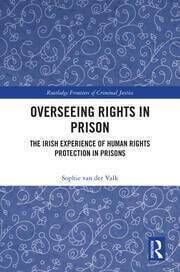Rights in prison examined in new book by Waterford author and post-doctoral researcher

Dr Sophie Van der Valk, from Kilmeaden, has just published her first book. Pic: Sophie Van der Valk on 'X'
A socio-legal researcher from Co Waterford has just published her first book titled, 'Overseeing Rights in Prison'.
Dr Sophie van der Valk, who is originally from Coolagadden, Kilmeaden, is a postdoctoral researcher with the School of Social Policy, Social Work and Social Justice on the project, 'Transforming Justice: An All-Island Examination of Justice Responses to Historical Institutional Abuse'.
She is a socio-legal researcher who received her PhD from Trinity College Dublin as part of the ERC funded, 'Prisons: the Rule of Law, Accountability and Rights (PRILA)', project.
Her PhD examined the experiences of those in prison, of human rights protecting mechanisms with a particular emphasis on complaint procedures, inspection and monitoring and the courts.
Her findings were used to inform the new framework of the Office of the Inspector of Prisons in Ireland and they have also been utilised in workshops, training days, conference presentations, reports, blogs and academic publications.
Her research has been published internationally and here at home in Ireland in journals such as the European Journal of Criminology and the Law and Society Review.
Ms Van der Valk has also conducted research in the field of counterterrorism with a special focus on issues concerning the prosecution and other measures used against foreign fighters.
The publication of her book brought great delight to the community in Kilmeaden were congratulations were conveyed to her from local people.
Now living in Luxembourg, on her own social media platforms she expressed delight herself at having the book published.

In the book, published through Routledge Taylor & Frances Group, she draws on Ireland as the primary case study.
According to the publishers the book is 'in- depth critical examination of how rights protection bodies and mechanisms are experienced by those in prison in Ireland'.
Through its analysis of the Irish experience, the book considers the implementation of, and challenges faced by, human rights protection within the prison context and explores some of the reforms that Ireland has undertaken in this area over the past 15 years.
Those reforms include the introduction of a new complaint system and establishment of an Office of the Inspector of Prisons.
The publishers also noted that using 'a wealth of information gathered through interviews and surveys of participants in three male prisons, the book sets out personal experiences of such mechanisms and identifies the key barriers to effective rights protection'.
Offering a detailed presentation of the international framework for the protection of prisoners’ rights through oversight mechanisms, and proposing methods for overcoming common barriers, 'Overseeing Rights in Prison: The Irish Experience of Human Rights Protection in Prisons' will be of interest to students and scholars of criminology, particularly in relation to prisons and human rights.






